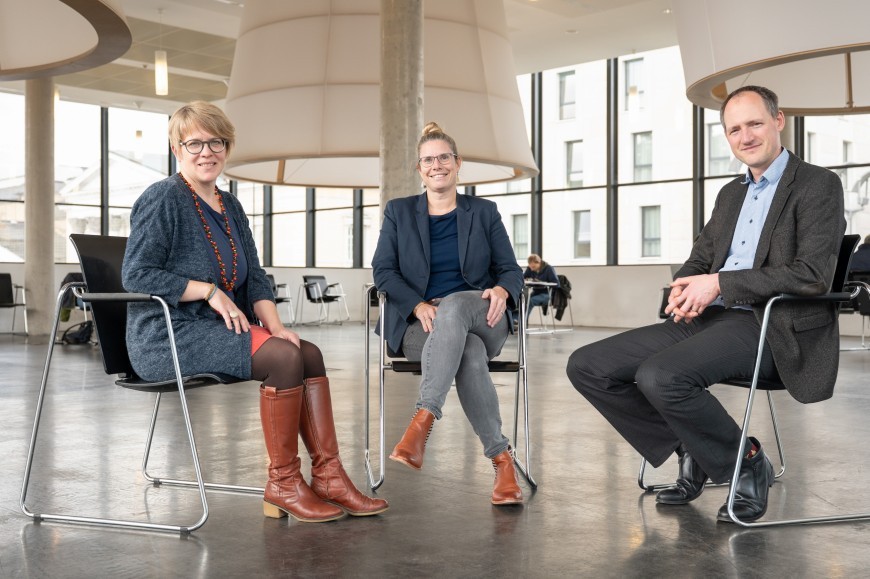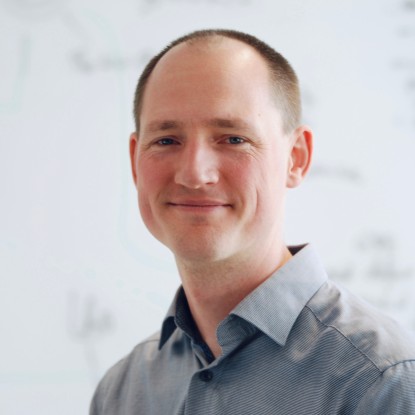The Unite! Award goes to …
Jan Philipp Hofmann, Bettina Wagner and Corinna Caspar-Terizakis
2025/10/29
An alliance like Unite! requires a great deal of commitment and dedication. This year's winners of the Unite! Awards have done so in a particularly remarkable way. Jan Philipp Hofmann, Bettina Wagner and Corinna Caspar-Terizakis from TU Darmstadt received the Unite! Award for their contribution to promoting young scientists.

The Unite! Awards are designed to recognise and celebrate the outstanding contributions of individuals or groups within the Unite! Alliance. Nominations were made via the nine partner universities, either for an individual or for a project, and were reviewed and judged by the Unite! Executive Board. The Unite! Governing Platform selected the nine award winners:
“Jan Philipp Hofmann, Bettina Wagner und Corinna Caspar-Terizakis have been instrumental in promoting young scientists from TUDa in the Unite! Alliance. They have played a key role in the strategic expansion of the Unite! Doctoral School through establishment of Unite! Multi-Cotutelle Agreement and the Unite! Doctoral Network in Energy Storage – A Hydrogen Vision for Sustainable Energy Storage as part of HORIZON-MSCA”, is their reasoning. The Unite! Award 2025 Ceremony took place during the Closing Plenary Session of the Aalto Dialogue, hosted by Aalto University in Espoo, Finland.
In this interview, the three winners of the Unite! Award for TU Darmstadt talk about Unite!, their motivation and the challenges they face in their work.
1. What is your role within Unite!?
Bettina Wagner: Within Unite! I am a member of the community that deals with Doctoral Education for Research, Innovation and Society. This community is made up of faculty members and administrative staff who discuss doctoral education from two interrelated perspectives. As managing director of TU Darmstadt’s university-wide graduate organisation Ingenium, I support my Unite! community in setting up the Unite! Doctoral School and in developing and implementing events, workshops, and trainings for the career development of doctoral candidates and Master students who are interested in pursuing a doctorate.
Corinna Caspar-Terizakis: My role within Unite! is divers: Firstly, I am responsible for the Individual Staff Mobility subgroup in the Unite! community for Professional Development and work on concepts and best practices for short-term mobilities, especially for our administrative staff. Secondly, due to my role as head of the Europe team in the International Office at TU Darmstadt, I support the community focused on Doctoral Education for Research, Innovation and Society.
In this latter area of support, I draw on the background of one of my roles at TU Darmstadt: here, in the International Office, I support our departments in drafting contracts for cotutelles, i.e., double doctorates between TU Darmstadt and another European university.
Jan Philipp Hofmann: Since joining TU Darmstadt in 2020, I’ve been deeply involved in advancing doctoral education and support. As (co-)speaker of the Graduate School of Energy Science and Engineering, I helped guide its transition into a new Graduate School format within the Research Field Energy + Environment. As a professor of Materials Science and a strong advocate for European collaboration, I contribute to the Unite! Cm.7 Doctoral Education initiative by helping shape and evaluate the structure, services, and educational opportunities for doctoral candidates across the alliance. Being part of the Unite! doctoral education community is truly inspiring — for me, it’s a two-way exchange. I bring new ideas and best practices from our local context to the European stage, and in turn, gain valuable insights that enrich our own graduate education at TU Darmstadt.
2. What motivated you to engage so strongly in the development of the Unite! Doctoral School and the support of early-career researchers within the alliance?
Bettina Wagner: I have always believed that early career researchers are the driving force of innovation and scientific progress. Supporting them means shaping the future of research and higher education at our University, TU Darmstadt, and within Unite!. The Unite! Doctoral School provides a unique opportunity to give young researchers access to international networks, interdisciplinary perspectives, and resources they would not have in a purely national context. For me, the motivation comes from seeing how these opportunities can empower Master students and doctoral candidates – and how their creativity and energy, in turn, strengthen our alliance.
Jan Philipp Hofmann: It gives me a lot of positive energy to see young researchers grow. The doctoral phase is a particularly special time in academic life — it is the stage where a broad education transforms into specialization and the ability to conduct independent, innovative research. Supporting this transition and nurturing young talent through well-structured, tailored programs is something I care about deeply. With its international and interdisciplinary focus, the Unite! network provides a unique platform for enabling international experience and broadening horizons.
3. The Unite! Multi-Cotutelle Agreement and the Doctoral Network in Energy Storage are important milestones. What were some of the key challenges and successes in bringing these initiatives to life?
Bettina Wagner: The main challenge in setting up the Unite! Multi-Cotutelle Agreement was to align different institutional regulations, traditions, and administrative procedures across our nine universities in nine countries. Each system has its own way of handling doctoral education, which required a lot of dialogue, patience, and trust-building.
Corinna Caspar-Terizakis: At the same time, this process became one of the greatest successes: it fostered a culture of cooperation and mutual understanding among our institutions. The Unite! Multi-Cotutelle Agreement now makes it much easier for doctoral candidates to pursue joint degrees. Our first cotutelle candidate within the Unite! cotutelle agreement at TU Darmstadt was already found and this within the MSCA Doctoral Network Unite!Energy.
Jan Philipp Hofmann: The Unite! network has played a key role in establishing the MSCA Doctoral Network UNITE!Energy (https://www.unite-energy-msca.eu/) which brings together 12 doctoral candidates to work on developing ‘a hydrogen vision for sustainable energy storage.’ This project nicely showcases the power of collaboration within Unite! — without the connections and trust among principal investigators and administration built through the alliance, such a successful proposal would not have been possible.
Unite!Energy breathes life into the Unite! Doctoral School by providing its very first cohort of doctoral candidates, who benefit from a structured program rich in educational opportunities and networking activities. The cotutelle agreement between the partner universities helps streamlining the administrative process for such large-scale, cross-border research initiatives.
Both initiatives demonstrate that, despite complexity, real progress is possible when we work together with a shared vision.
4. How do you see the role of international cooperation in doctoral education evolving within European university alliances like Unite!?
Corinna Caspar-Terizakis: I see international cooperation becoming not just an add-on, but an integral part of doctoral education. Doctoral candidates increasingly work on global challenges – such as AI, climate change, digital transformation, or sustainable energy – that cannot be solved within one discipline or one country. Alliances like Unite! make it possible to connect talents, research infrastructures, and expertise across borders in a structured way.
5. What advice would you give to colleagues or institutions aiming to drive similar cross-border initiatives in research and doctoral training?
Corinna Caspar-Terizakis: My main advice would be: be patient but stay ambitious. Building cross-border initiatives always takes time, because you need to reconcile different systems, languages, and cultures. But if you keep the focus on the needs of the doctoral candidates and the added value of cooperation, you will find solutions.
Bettina Wagner: It is also essential to build trust and personal relationships among colleagues – without that, agreements remain only on paper. Finally, celebrate small successes along the way: every joint workshop, every co-supervised dissertation, every new network is a step towards a stronger, more connected research community.
The questions were asked by Mareike Hochschild.


